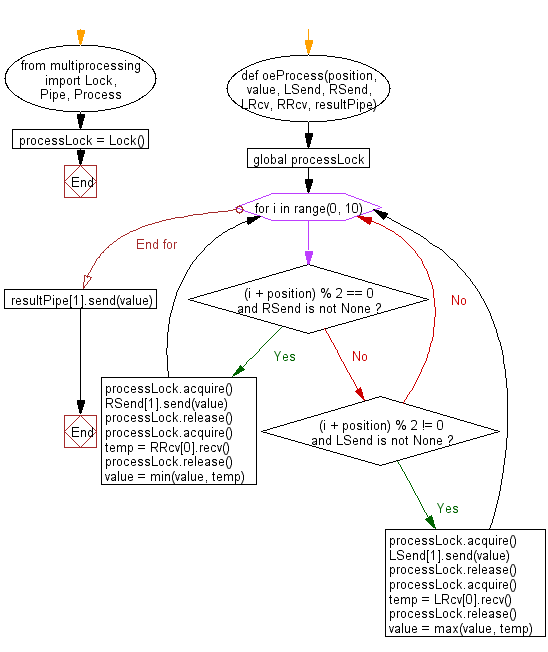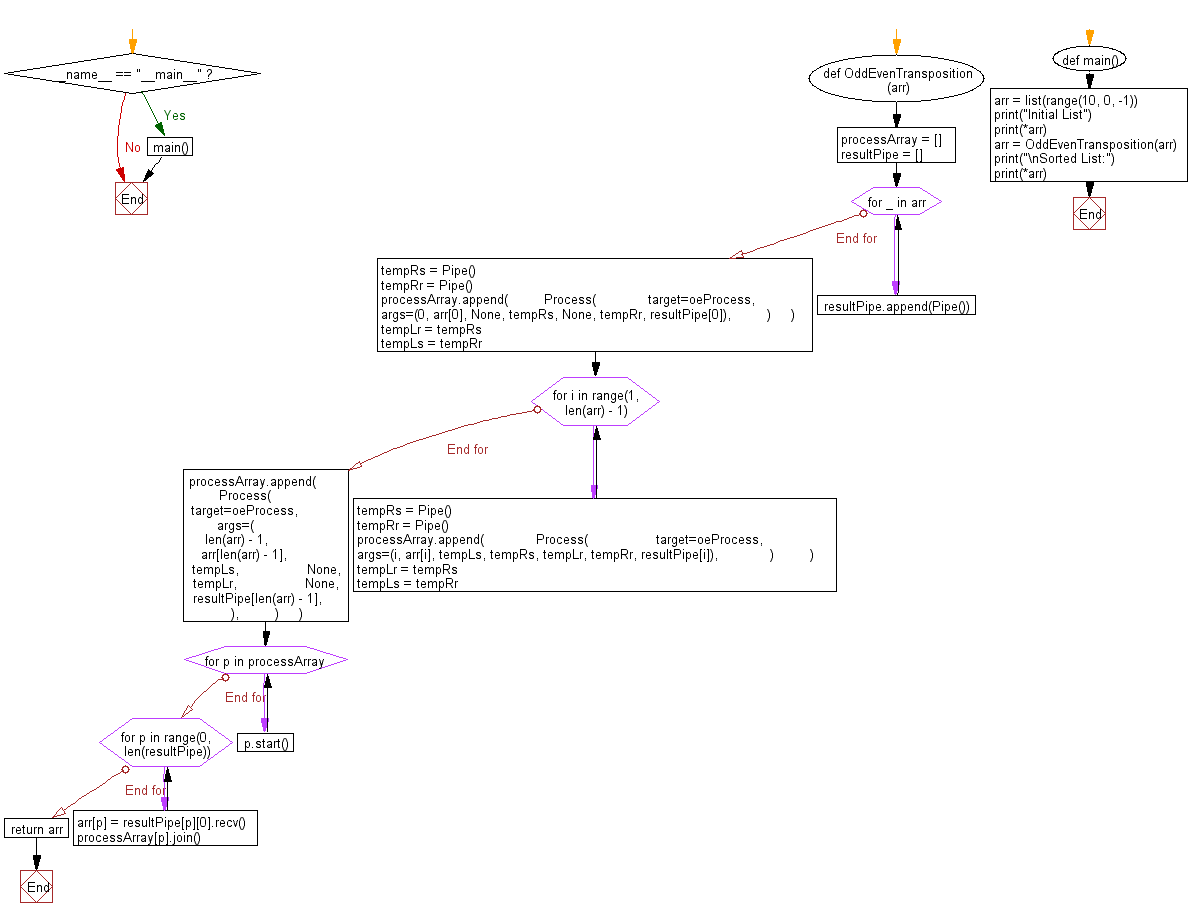Python: Sort unsorted numbers using Odd Even Transposition Parallel sort
37. Parallel Odd-Even Sort
Write a Python program to sort unsorted numbers using Odd Even Transposition Parallel sort.
Odd Even Transposition Parallel sort:
This is an implementation of odd-even transposition sort.
It works by performing a series of parallel swaps between odd and even pairs of variables in the list.
This implementation represents each variable in the list with a process and each process communicates with its neighbouring processes in the list to perform comparisons.
They are synchronized with locks and message passing but other forms of synchronization could be used
Sample Solution:
Python Code:
#Ref.https://bit.ly/3cce7iB
from multiprocessing import Lock, Pipe, Process
# lock used to ensure that two processes do not access a pipe at the same time
processLock = Lock()
def oeProcess(position, value, LSend, RSend, LRcv, RRcv, resultPipe):
global processLock
# we perform n swaps since after n swaps we know we are sorted
# we *could* stop early if we are sorted already, but it takes as long to
# find out we are sorted as it does to sort the list with this algorithm
for i in range(0, 10):
if (i + position) % 2 == 0 and RSend is not None:
# send your value to your right neighbor
processLock.acquire()
RSend[1].send(value)
processLock.release()
# receive your right neighbor's value
processLock.acquire()
temp = RRcv[0].recv()
processLock.release()
# take the lower value since you are on the left
value = min(value, temp)
elif (i + position) % 2 != 0 and LSend is not None:
# send your value to your left neighbor
processLock.acquire()
LSend[1].send(value)
processLock.release()
# receive your left neighbor's value
processLock.acquire()
temp = LRcv[0].recv()
processLock.release()
# take the higher value since you are on the right
value = max(value, temp)
# after all swaps are performed, send the values back to main
resultPipe[1].send(value)
"""
the function which creates the processes that perform the parallel swaps
arr = the list to be sorted
"""
def OddEvenTransposition(arr):
processArray = []
resultPipe = []
# initialize the list of pipes where the values will be retrieved
for _ in arr:
resultPipe.append(Pipe())
# creates the processes
# the first and last process only have one neighbor so they are made outside
# of the loop
tempRs = Pipe()
tempRr = Pipe()
processArray.append(
Process(
target=oeProcess,
args=(0, arr[0], None, tempRs, None, tempRr, resultPipe[0]),
)
)
tempLr = tempRs
tempLs = tempRr
for i in range(1, len(arr) - 1):
tempRs = Pipe()
tempRr = Pipe()
processArray.append(
Process(
target=oeProcess,
args=(i, arr[i], tempLs, tempRs, tempLr, tempRr, resultPipe[i]),
)
)
tempLr = tempRs
tempLs = tempRr
processArray.append(
Process(
target=oeProcess,
args=(
len(arr) - 1,
arr[len(arr) - 1],
tempLs,
None,
tempLr,
None,
resultPipe[len(arr) - 1],
),
)
)
# start the processes
for p in processArray:
p.start()
# wait for the processes to end and write their values to the list
for p in range(0, len(resultPipe)):
arr[p] = resultPipe[p][0].recv()
processArray[p].join()
return arr
# creates a reverse sorted list and sorts it
def main():
arr = list(range(10, 0, -1))
print("Initial List")
print(*arr)
arr = OddEvenTransposition(arr)
print("\nSorted List:")
print(*arr)
if __name__ == "__main__":
main()
Sample Output:
Initial List 10 9 8 7 6 5 4 3 2 1 Sorted List: 1 2 3 4 5 6 7 8 9 10
Flowchart:


For more Practice: Solve these Related Problems:
- Write a Python program to simulate parallel odd-even transposition sort using multithreading and print the sorted result.
- Write a Python script to implement parallel odd-even sort where each element is processed by a separate thread, then merge the results.
- Write a Python program to compare the performance of parallel odd-even sort with sequential odd-even sort on a large list.
- Write a Python function to implement a parallel version of odd-even sort using process pools and then validate its correctness.
Go to:
Previous: Write a Python program to sort unsorted numbers using non-parallelized implementation of odd-even transposition sort.
Next: Write a Python program to sort unsorted strings using natural sort.
Python Code Editor:
Contribute your code and comments through Disqus.
What is the difficulty level of this exercise?
Test your Programming skills with w3resource's quiz.
